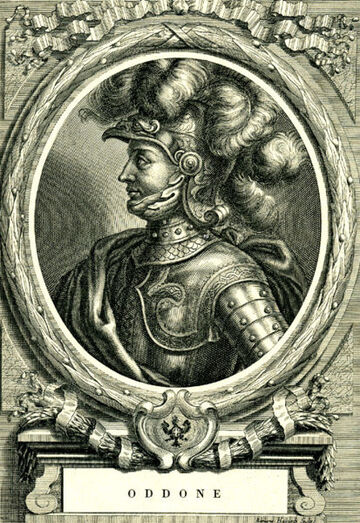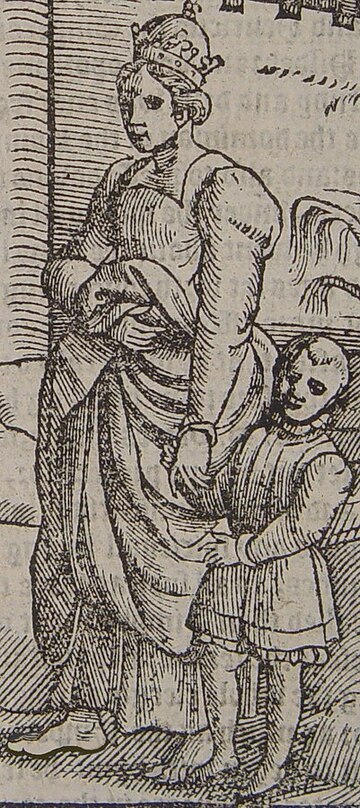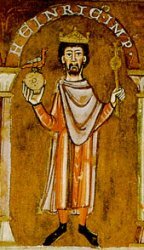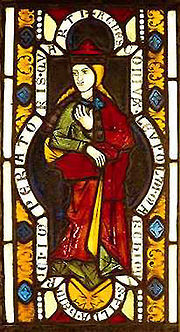maximum test » Bertha "von Turin" of Savoy (1051-1087)
Persoonlijke gegevens Bertha "von Turin" of Savoy
- Roepnaam is von Turin.
- Zij is geboren op 21 september 1051 in Maurienne, Savoie, France.
 Let op: Leeftijd bij trouwen (13 juli 1066) lag beneden de 16 jaar (14).
Let op: Leeftijd bij trouwen (13 juli 1066) lag beneden de 16 jaar (14). - Beroepen:
- Markgrevinna av Savoyen.
- Condessa de Moriana.
- Zij is overleden op 27 december 1087, zij was toen 36 jaar oudMainz
Rhineland-Palatinate Duitsland. - Zij is begraven in Speyer, Rheinland-Pfalz, Duitsland.
- Een kind van Otto of Savoy en Adelaide of the Arduinici
- Deze gegevens zijn voor het laatst bijgewerkt op 24 oktober 2019.
Gezin van Bertha "von Turin" of Savoy
Zij is getrouwd met Henry.
Zij zijn getrouwd op 13 juli 1066, zij was toen 14 jaar oudTrebur
Hesse Duitsland.
Kind(eren):
Notities over Bertha "von Turin" of Savoy
Bertha ble bisatt i domkirken i Speier.
She and Henry were engaged in 1055, when the future king was 5 years old. As
to her husband, Henry, his contemporary opponents considered the tall,
handsome king a tyrant -- the crafty head of heresy --- whose death they
cheered because it seemed to usher in a new age. His friends praised him as a
pius, gentle, and intelligent ruler, a patron of the arts and sciences who
surrounded himself with religious scholars and who, in his sense of law and
justice, was the embodiment of the ideal king.
She and Henry were engaged in 1055, when the future king was 5 years old. As
to her husband, Henry, his contemporary opponents considered the tall,
handsome king a tyrant -- the crafty head of heresy --- whose death they
cheered because it seemed to usher in a new age. His friends praised him as a
pius, gentle, and intelligent ruler, a patron of the arts and sciences who
surrounded himself with religious scholars and who, in his sense of law and
justice, was the embodiment of the ideal king.
She and Henry were engaged in 1055, when the future king was 5 years old. As
to her husband, Henry, his contemporary opponents considered the tall,
handsome king a tyrant -- the crafty head of heresy --- whose death they
cheered because it seemed to usher in a new age. His friends praised him as a
pius, gentle, and intelligent ruler, a patron of the arts and sciences who
surrounded himself with religious scholars and who, in his sense of law and
justice, was the embodiment of the ideal king.
She and Henry were engaged in 1055, when the future king was 5 years old. As
to her husband, Henry, his contemporary opponents considered the tall,
handsome king a tyrant -- the crafty head of heresy --- whose death they
cheered because it seemed to usher in a new age. His friends praised him as a
pius, gentle, and intelligent ruler, a patron of the arts and sciences who
surrounded himself with religious scholars and who, in his sense of law and
justice, was the embodiment of the ideal king.
{geni:about_me} http://en.wikipedia.org/wiki/Bertha_of_Savoy
http://genealogics.org/getperson.php?personID=I00027237&tree=LEO
and in German:
http://de.wikipedia.org/wiki/Bertha_%28Kaiserin%29
Bertha of Savoy, also called Bertha of Turin (21 September 1051 – 27 December 1087 in Mainz) was the first wife of Emperor Henry IV, and was German Queen and Holy Roman Empress. She is buried in the cathedral of Speyer.
[edit] Life
Bertha of Savoy was a daughter of Otto of Savoy (also called Eudes and Odo) and Adelaide of Susa. Her maternal grandparents were Ulric Manfred II of Turin and Bertha of the Obertenghi.
As children, during the lifetime of Emperor Henry III, Bertha and Henry IV were betrothed on 25 December 1055 in Zürich. The wedding took place on 13 July 1066 in Trebur. While Bertha was apparently in love with Henry from the outset, Henry initially viewed his wife with aversion. Although she was apparently a pretty young woman, the Saxon chronicler Bruno, an avowed opponent of Henry IV, reported on the Emperor's continual unfaithfulness: "He had two or three Kebsweiber (concubines) at the same time, in addition [to his wife], yet he was not content. If he heard that someone had a young and pretty daughter or wife, he instructed that she be supplied to him by force. (...) His beautiful and noble wife Bertha (...) was in such a manner hated by him that he never saw her after the wedding any more than necessary, since he had not celebrated the wedding out of free will."
In 1069, Henry began procedures for a divorce, supplying what was for the time an unusually honest reason for the divorce: "The king explained publicly (before the princes), that his relationship with his wife was not good; for a long time he had deceived others, but now he did not want to do so any longer. He could not accuse her of anything that justified a divorce, but he was not capable of carrying out conjugal relations with her any longer. He asked them for the sake of God to remove him from the bonds of a marriage closed under bad signs ... so that the way to a luckier marriage might be opened. And nobody knowing any objection to raise, and his wife being an obstacle to a second marriage ceremony, he then swore that she was as he received her, unstained and her virginity intact." (Bruno of Merseburg)
The German episcopacy dared not submit to the King's demands, and called on Pope Alexander II for assistance. He sent Petrus Damiani as his Legate to the Synod in Frankfurt, and rejected the divorce. Henry then apparently submitted to his fate, his first daughter by Bertha being born in the year after the divorce attempt.
Bertha also accompanied her husband on his dangerous journey to Canossa, carrying her three-year-old son Conrad. She remained with her husband between 25-28 January 1077 in freezing cold weather before the walls of the castle, in order to reach the solution to Henry's dispute with the Pope. Together with Henry, Bertha later also journeyed to Rome, and on 31 March 1084 was crowned Empress.
On 27 December 1087, Bertha died in Mainz.
[edit] Children
From her marriage with Henry there were eventually five children:
* Adelheid (1070-4 June 1079)
* Henry (1071-2 August 1071)
* Agnes of Duitsland (1072/73-24 September 1143)
* Conrad (12 February 1074-27 July 1101), later Roman-German King and King of Italy
* Henry V (8 January 1086-23 May 1125), later Roman-German King and Holy Roman Emperor
Bertha von Savoyen oder auch Bertha von Turin (* 21. September 1051; † 27. Dezember 1087 in Mainz) war als Gemahlin Heinrichs IV. Deutsche Königin und Römische Kaiserin. Sie war die Tochter des Grafen Otto von Savoyen (Haus Savoyen) und der Adelheid von Turin (Arduine). Ihr Grab befindet sich im Dom zu Speyer.
Inhaltsverzeichnis
[Verbergen]
* 1 Heirat
* 2 Heinrichs Scheidungsverlangen
* 3 Die weitere Ehe und Kinder
* 4 Quellen
* 5 Weblinks
Heirat [Bearbeiten]
Bereits als Kinder und noch zu Lebzeiten Heinrichs III. waren Heinrich IV. und Bertha am 25. Dezember 1055 in Zürich verlobt worden. Die Hochzeit fand am 13. Juli 1066 in Tribur statt. Während Bertha den Quellen zufolge ihrem Mann von Anfang an in Liebe und Treue zugetan war, begegnete Heinrich seiner Frau, die er auf Anordnung seines Vaters geheiratet hatte, erst einmal nur mit Widerwillen. Obwohl sie eine hübsche junge Frau gewesen sein soll, berichtet der sächsische Chronist Bruno, ein erklärter Gegner Heinrichs IV., von dessen fortgesetzter Untreue:
„Zwei oder drei Kebsweiber hatte er zur gleichen Zeit, aber auch damit war er noch nicht zufrieden. Wenn er hörte, jemand habe eine junge und hübsche Tochter oder Gemahlin, befahl er, sie ihm mit Gewalt zuzuführen. (...) Seine schöne und edle Gemahlin Bertha (...) war ihm derart verhaßt, daß er sie nach der Hochzeit aus freien Stücken niemals mehr sah, da er auch die Hochzeit selbst nicht mit freiem Willen gefeiert hatte.“
Heinrichs Scheidungsverlangen [Bearbeiten]
Grab der Kaiserin Bertha im Dom zu Speyer
Heinrich strengte im Jahr 1069 sogar ein Scheidungsverfahren an und lieferte eine für die damalige Zeit außergewöhnlich ehrliche wie aussichtslose Scheidungsbegründung:
„Der König erklärte öffentlich (vor den Fürsten), er stehe sich mit seiner Gemahlin nicht gut; lange habe er die Menschen getäuscht, aber nun wolle er sie nicht länger täuschen. Er könne ihr nichts vorwerfen, was eine Scheidung rechtfertige, aber er sei nicht imstande, die eheliche Gemeinschaft mit ihr zu vollziehen. Er bitte sie daher um Gottes willen, ihn von der Fessel dieser unter schlimmen Vorzeichen geschlossenen Ehe zu lösen und die Trennung freudwillig zu dulden, damit er ihr und sie ihm den Weg zu einer glücklicheren Ehe eröffne. Und damit niemand den Einwand erheben könne, ihre einmal verletzte Keuschheit sei ein Hindernis für eine zweite Eheschließung, so schwöre er, daß sie so sei, wie er sie empfangen habe, unbefleckt und in unversehrter Jungfräulichkeit.“ (Bruno von Merseburg)
Ein derartiges Scheidungsverlangen wagte das deutsche Episkopat nicht zu entscheiden und rief den Papst Alexander II. an. Der sandte seinen Legaten Petrus Damiani auf die Synode zu Frankfurt und lehnte die Scheidung ab. Daraufhin schien sich Heinrich in sein Schicksal gefügt zu haben, wurde doch im Jahr darauf die erste Tochter des Paares geboren.
Die weitere Ehe und Kinder [Bearbeiten]
Bertha begleitete ihren Gemahl schließlich auch auf der gefährlichen Reise nach Canossa, ihren dreijährigen Sohn Konrad in den Armen tragend. Sie hielt mit ihrem Mann vom 25. bis zum 28. Januar 1077 in der klirrenden Kälte vor den Mauern der Burg aus, um die Lösung des päpstlichen Bannes zu erreichen.
Gemeinsam mit Heinrich zog Bertha später auch nach Rom und wurde dort am 31. März 1084 zur Kaiserin gekrönt.
Am 27. Dezember 1087 verstarb Bertha in Mainz. Aus der Ehe mit Heinrich gingen schließlich fünf Kinder hervor:
* Adelheid (1070–4. Juni vor 1079)
* Heinrich (1071–2. August 1071)
* Agnes von Waiblingen (1072/73–24. September 1143)
* Konrad (III.) (12. Februar 1074–27. Juli 1101)
* Heinrich V. (8. Januar 1086–23. Mai 1125)
Quellen [Bearbeiten]
* Bruno von Merseburg: Brunonis Saxonicum bellum. Brunos Sachsenkrieg. - Übersetzt v. Franz-Josef Schmale. - In: Quellen zur Geschichte Kaiser Heinrichs IV. - Darmstadt, 1968. - (= Ausgewählte Quellen zur deutschen Geschichte des Mittelalters. Freiherr vom Stein-Gedächtnisausgabe ; 12). - S. 191-405.
--------------------
http://en.wikipedia.org/wiki/Bertha_of_Savoy
--------------------
Bertha of Savoy, also called Bertha of Turin (21 September 1051 – 27 December 1087 in Mainz) was the first wife of Emperor Henry IV, and was German Queen and Holy Roman Empress. She is buried in the cathedral of Speyer.
Bertha of Savoy was a daughter of Otto of Savoy (also called Eudes and Odo) and Adelaide of Susa. Her maternal grandparents were Ulric Manfred II of Turin and Bertha of the Obertenghi.
As children, during the lifetime of Emperor Henry III, Bertha and Henry IV were betrothed on 25 December 1055 in Zürich. The wedding took place on 13 July 1066 in Trebur. While Bertha was apparently in love with Henry from the outset, Henry initially viewed his wife with aversion. Although she was apparently a pretty young woman, the Saxon chronicler Bruno, an avowed opponent of Henry IV, reported on the Emperor's continual unfaithfulness: "He had two or three Kebsweiber (concubines) at the same time, in addition [to his wife], yet he was not content. If he heard that someone had a young and pretty daughter or wife, he instructed that she be supplied to him by force. (...) His beautiful and noble wife Bertha (...) was in such a manner hated by him that he never saw her after the wedding any more than necessary, since he had not celebrated the wedding out of free will."
In 1069, Henry began procedures for a divorce, supplying what was for the time an unusually honest reason for the divorce: "The king explained publicly (before the princes), that his relationship with his wife was not good; for a long time he had deceived others, but now he did not want to do so any longer. He could not accuse her of anything that justified a divorce, but he was not capable of carrying out conjugal relations with her any longer. He asked them for the sake of God to remove him from the bonds of a marriage closed under bad signs ... so that the way to a luckier marriage might be opened. And nobody knowing any objection to raise, and his wife being an obstacle to a second marriage ceremony, he then swore that she was as he received her, unstained and her virginity intact." (Bruno of Merseburg)
The German episcopacy dared not submit to the King's demands, and called on Pope Alexander II for assistance. He sent Petrus Damiani as his Legate to the Synod in Frankfurt, and rejected the divorce. Henry then apparently submitted to his fate, his first daughter by Bertha being born in the year after the divorce attempt.
Bertha also accompanied her husband on his dangerous journey to Canossa, carrying her three-year-old son Conrad. She remained with her husband between 25-28 January 1077 in freezing cold weather before the walls of the castle, in order to reach the solution to Henry's dispute with the Pope. Together with Henry, Bertha later also journeyed to Rome, and on 31 March 1084 was crowned Empress.
On 27 December 1087, Bertha died in Mainz.
Children
From her marriage with Henry there were eventually five children:
Adelheid (1070-4 June 1079)
Henry (1071-2 August 1071)
Agnes of Duitsland (1072/73-24 September 1143)
Conrad (12 February 1074-27 July 1101), later Roman-German King and King of Italy
Henry V (8 January 1086-23 May 1125), later Roman-German King and Holy Roman Emperor
--------------------
http://geneall.net/I/per_page.php?id=10871
http://de.wikipedia.org/wiki/Bertha_(Kaiserin)
Bertha von Savoyen oder auch Bertha von Turin (* 21. September 1051; † 27. Dezember 1087 in Mainz) war als Gemahlin Heinrichs IV. Deutsche Königin und Römische Kaiserin. Sie war die Tochter des Grafen Otto von Savoyen (Haus Savoyen) und der Adelheid von Turin (Arduine). Ihr Grab befindet sich im Dom zu Speyer.
Inhaltsverzeichnis
[Verbergen]
* 1 Heirat
* 2 Heinrichs Scheidungsverlangen
* 3 Die weitere Ehe und Kinder
* 4 Quellen
* 5 Weblinks
Heirat [Bearbeiten]
Bereits als Kinder und noch zu Lebzeiten Heinrichs III. waren Heinrich IV. und Bertha am 25. Dezember 1055 in Zürich verlobt worden. Die Hochzeit fand am 13. Juli 1066 in Tribur statt. Während Bertha den Quellen zufolge ihrem Mann von Anfang an in Liebe und Treue zugetan war, begegnete Heinrich seiner Frau, die er auf Anordnung seines Vaters geheiratet hatte, erst einmal nur mit Widerwillen. Obwohl sie eine hübsche junge Frau gewesen sein soll, berichtet der sächsische Chronist Bruno, ein erklärter Gegner Heinrichs IV., von dessen fortgesetzter Untreue:
„Zwei oder drei Kebsweiber hatte er zur gleichen Zeit, aber auch damit war er noch nicht zufrieden. Wenn er hörte, jemand habe eine junge und hübsche Tochter oder Gemahlin, befahl er, sie ihm mit Gewalt zuzuführen. (...) Seine schöne und edle Gemahlin Bertha (...) war ihm derart verhaßt, daß er sie nach der Hochzeit aus freien Stücken niemals mehr sah, da er auch die Hochzeit selbst nicht mit freiem Willen gefeiert hatte.“
Heinrichs Scheidungsverlangen [Bearbeiten]
Grab der Kaiserin Bertha im Dom zu Speyer
Heinrich strengte im Jahr 1069 sogar ein Scheidungsverfahren an und lieferte eine für die damalige Zeit außergewöhnlich ehrliche wie aussichtslose Scheidungsbegründung:
„Der König erklärte öffentlich (vor den Fürsten), er stehe sich mit seiner Gemahlin nicht gut; lange habe er die Menschen getäuscht, aber nun wolle er sie nicht länger täuschen. Er könne ihr nichts vorwerfen, was eine Scheidung rechtfertige, aber er sei nicht imstande, die eheliche Gemeinschaft mit ihr zu vollziehen. Er bitte sie daher um Gottes willen, ihn von der Fessel dieser unter schlimmen Vorzeichen geschlossenen Ehe zu lösen und die Trennung freudwillig zu dulden, damit er ihr und sie ihm den Weg zu einer glücklicheren Ehe eröffne. Und damit niemand den Einwand erheben könne, ihre einmal verletzte Keuschheit sei ein Hindernis für eine zweite Eheschließung, so schwöre er, daß sie so sei, wie er sie empfangen habe, unbefleckt und in unversehrter Jungfräulichkeit.“ (Bruno von Merseburg)
Ein derartiges Scheidungsverlangen wagte das deutsche Episkopat nicht zu entscheiden und rief den Papst Alexander II. an. Der sandte seinen Legaten Petrus Damiani auf die Synode zu Frankfurt und lehnte die Scheidung ab. Daraufhin schien sich Heinrich in sein Schicksal gefügt zu haben, wurde doch im Jahr darauf die erste Tochter des Paares geboren.
Die weitere Ehe und Kinder [Bearbeiten]
Bertha begleitete ihren Gemahl schließlich auch auf der gefährlichen Reise nach Canossa, ihren dreijährigen Sohn Konrad in den Armen tragend. Sie hielt mit ihrem Mann vom 25. bis zum 28. Januar 1077 in der klirrenden Kälte vor den Mauern der Burg aus, um die Lösung des päpstlichen Bannes zu erreichen.
Gemeinsam mit Heinrich zog Bertha später auch nach Rom und wurde dort am 31. März 1084 zur Kaiserin gekrönt.
Am 27. Dezember 1087 verstarb Bertha in Mainz. Aus der Ehe mit Heinrich gingen schließlich fünf Kinder hervor:
* Adelheid (1070–4. Juni vor 1079)
* Heinrich (1071–2. August 1071)
* Agnes von Waiblingen (1072/73–24. September 1143)
* Konrad (III.) (12. Februar 1074–27. Juli 1101)
* Heinrich V. (8. Januar 1086–23. Mai 1125)
Quellen [Bearbeiten]
* Bruno von Merseburg: Brunonis Saxonicum bellum. Brunos Sachsenkrieg. - Übersetzt v. Franz-Josef Schmale. - In: Quellen zur Geschichte Kaiser Heinrichs IV. - Darmstadt, 1968. - (= Ausgewählte Quellen zur deutschen Geschichte des Mittelalters. Freiherr vom Stein-Gedächtnisausgabe ; 12). - S. 191-405.
--------------------
Bertha of Savoy, also called Bertha of Turin (21 September 1051 – 27 December 1087 in Mainz) was the first wife of Emperor Henry IV, and was German Queen and Holy Roman Empress. She is buried in the cathedral of Speyer.
Bertha of Savoy was a daughter of Otto of Savoy (also called Eudes and Odo) and Adelaide of Susa. Her maternal grandparents were Ulric Manfred II of Turin and Bertha of the Obertenghi.
As children, during the lifetime of Emperor Henry III, Bertha and Henry IV were betrothed on 25 December 1055 in Zürich. The wedding took place on 13 July 1066 in Trebur. While Bertha was apparently in love with Henry from the outset, Henry initially viewed his wife with aversion. Although she was apparently a pretty young woman, the Saxon chronicler Bruno, an avowed opponent of Henry IV, reported on the Emperor's continual unfaithfulness: "He had two or three Kebsweiber (concubines) at the same time, in addition [to his wife], yet he was not content. If he heard that someone had a young and pretty daughter or wife, he instructed that she be supplied to him by force. (...) His beautiful and noble wife Bertha (...) was in such a manner hated by him that he never saw her after the wedding any more than necessary, since he had not celebrated the wedding out of free will."
In 1069, Henry began procedures for a divorce, supplying what was for the time an unusually honest reason for the divorce: "The king explained publicly (before the princes), that his relationship with his wife was not good; for a long time he had deceived others, but now he did not want to do so any longer. He could not accuse her of anything that justified a divorce, but he was not capable of carrying out conjugal relations with her any longer. He asked them for the sake of God to remove him from the bonds of a marriage closed under bad signs ... so that the way to a luckier marriage might be opened. And nobody knowing any objection to raise, and his wife being an obstacle to a second marriage ceremony, he then swore that she was as he received her, unstained and her virginity intact." (Bruno of Merseburg)
The German episcopacy dared not submit to the King's demands, and called on Pope Alexander II for assistance. He sent Petrus Damiani as his Legate to the Synod in Frankfurt, and rejected the divorce. Henry then apparently submitted to his fate, his first daughter by Bertha being born in the year after the divorce attempt.
Bertha also accompanied her husband on his dangerous journey to Canossa, carrying her three-year-old son Conrad. She remained with her husband between 25-28 January 1077 in freezing cold weather before the walls of the castle, in order to reach the solution to Henry's dispute with the Pope. Together with Henry, Bertha later also journeyed to Rome, and on 31 March 1084 was crowned Empress.
On 27 December 1087, Bertha died in Mainz.
Children
From her marriage with Henry there were eventually five children:
Adelheid (1070-4 June 1079)
Henry (1071-2 August 1071)
Agnes of Duitsland (1072/73-24 September 1143)
Conrad (12 February 1074-27 July 1101), later Roman-German King and King of Italy
Henry V (8 January 1086-23 May 1125), later Roman-German King and Holy Roman Emperor
--------------------
Bertha ble bisatt i domkirken i Speier.
Kilder:
Erich Brandenburg: Die Nachkommen Karls des Grossen. Leipzig 1935. Mogens Bugge: Våre forfedre, nr. 322. Bent og Vidar Billing Hansen: Rosensverdslektens forfedre, side 91, 92.
--------------------
Bertha of Savoy
From Wikipedia, the free encyclopedia
Bertha of Savoy, also called Bertha of Turin (21 September 1051 – 27 December 1087 in Mainz) was the first wife of Emperor Henry IV, and was German Queen and Holy Roman Empress. She is buried in the cathedral of Speyer.
[edit]Life
Bertha of Savoy was a daughter of Otto of Savoy (also called Eudes and Odo) and Adelaide of Susa. Her maternal grandparents were Ulric Manfred II of Turin and Bertha of the Obertenghi.
As children, during the lifetime of Emperor Henry III, Bertha and Henry IV were betrothed on 25 December 1055 in Zürich. The wedding took place on 13 July 1066 in Trebur. While Bertha was apparently in love with Henry from the outset, Henry initially viewed his wife with aversion. Although she was apparently a pretty young woman, the Saxon chronicler Bruno, an avowed opponent of Henry IV, reported on the Emperor's continual unfaithfulness: "He had two or three Kebsweiber (concubines) at the same time, in addition [to his wife], yet he was not content. If he heard that someone had a young and pretty daughter or wife, he instructed that she be supplied to him by force. (...) His beautiful and noble wife Bertha (...) was in such a manner hated by him that he never saw her after the wedding any more than necessary, since he had not celebrated the wedding out of free will."
In 1069, Henry began procedures for a divorce, supplying what was for the time an unusually honest reason for the divorce: "The king explained publicly (before the princes), that his relationship with his wife was not good; for a long time he had deceived others, but now he did not want to do so any longer. He could not accuse her of anything that justified a divorce, but he was not capable of carrying out conjugal relations with her any longer. He asked them for the sake of God to remove him from the bonds of a marriage closed under bad signs ... so that the way to a luckier marriage might be opened. And nobody knowing any objection to raise, and his wife being an obstacle to a second marriage ceremony, he then swore that she was as he received her, unstained and her virginity intact." (Bruno of Merseburg)
The German episcopacy dared not submit to the King's demands, and called on Pope Alexander II for assistance. He sent Petrus Damiani as his Legate to the Synod in Frankfurt, and rejected the divorce. Henry then apparently submitted to his fate, his first daughter by Bertha being born in the year after the divorce attempt.
Bertha also accompanied her husband on his dangerous journey to Canossa, carrying her three-year-old son Conrad. She remained with her husband between 25-28 January 1077 in freezing cold weather before the walls of the castle, in order to reach the solution to Henry's dispute with the Pope. Together with Henry, Bertha later also journeyed to Rome, and on 31 March 1084 was crowned Empress.
On 27 December 1087, Bertha died in Mainz.
[edit]Children
From her marriage with Henry there were eventually five children:
Adelheid (1070-4 June 1079)
Henry (1071-2 August 1071)
Agnes of Duitsland (1072/73-24 September 1143)
Conrad (12 February 1074-27 July 1101), later Roman-German King and King of Italy
Henry V (8 January 1086-23 May 1125), later Roman-German King and Holy Roman Emperor
[edit]Sources
Bruno von Merseburg: Brunonis Saxonicum bellum. Brunos Sachsenkrieg. - Übersetzt v. Franz-Josef Schmale. - In: Quellen zur Geschichte Kaiser Heinrichs IV. - Darmstadt, 1968. - (= Ausgewählte Quellen zur deutschen Geschichte des Mittelalters. Freiherr vom Stein-Gedächtnisausgabe ; 12). - S. 191-405.
Ancestral Roots of Certain American Colonists Who Came to America Before 1700 by Frederick Lewis Weis, Lines 45-23, 274-22, 274-23.
--------------------
Bertha of Savoy, also called Bertha of Turin (21 September 1051 – 27 December 1087 in Mainz) was the first wife of Emperor Henry IV, and was German Queen and Holy Roman Empress. She is buried in the cathedral of Speyer.
Life
Bertha of Savoy was a daughter of Otto of Savoy (also called Eudes and Odo) and Adelaide of Susa. Her maternal grandparents were Ulric Manfred II of Turin and Bertha of the Obertenghi.
As children, during the lifetime of Emperor Henry III, Bertha and Henry IV were betrothed on 25 December 1055 in Zürich. The wedding took place on 13 July 1066 in Trebur. While Bertha was apparently in love with Henry from the outset, Henry initially viewed his wife with aversion. Although she was apparently a pretty young woman, the Saxon chronicler Bruno, an avowed opponent of Henry IV, reported on the Emperor's continual unfaithfulness: "He had two or three Kebsweiber (concubines) at the same time, in addition [to his wife], yet he was not content. If he heard that someone had a young and pretty daughter or wife, he instructed that she be supplied to him by force. (...) His beautiful and noble wife Bertha (...) was in such a manner hated by him that he never saw her after the wedding any more than necessary, since he had not celebrated the wedding out of free will."
In 1069, Henry began procedures for a divorce, supplying what was for the time an unusually honest reason for the divorce: "The king explained publicly (before the princes), that his relationship with his wife was not good; for a long time he had deceived others, but now he did not want to do so any longer. He could not accuse her of anything that justified a divorce, but he was not capable of carrying out conjugal relations with her any longer. He asked them for the sake of God to remove him from the bonds of a marriage closed under bad signs ... so that the way to a luckier marriage might be opened. And nobody knowing any objection to raise, and his wife being an obstacle to a second marriage ceremony, he then swore that she was as he received her, unstained and her virginity intact." (Bruno of Merseburg)
The German episcopacy dared not submit to the King's demands, and called on Pope Alexander II for assistance. He sent Petrus Damiani as his Legate to the Synod in Frankfurt, and rejected the divorce. Henry then apparently submitted to his fate, his first daughter by Bertha being born in the year after the divorce attempt.
Bertha also accompanied her husband on his dangerous journey to Canossa, carrying her three-year-old son Conrad. She remained with her husband between 25-28 January 1077 in freezing cold weather before the walls of the castle, in order to reach the solution to Henry's dispute with the Pope. Together with Henry, Bertha later also journeyed to Rome, and on 31 March 1084 was crowned Empress.
On 27 December 1087, Bertha died in Mainz.
Children
From her marriage with Henry there were eventually five children:
Adelheid (1070-4 June 1079)
Henry (1071-2 August 1071)
Agnes of Duitsland (1072/73-24 September 1143)
Conrad (12 February 1074-27 July 1101), later Roman-German King and King of Italy
Henry V (8 January 1086-23 May 1125), later Roman-German King and Holy Roman Emperor
Em Junho de 1066 Henrique casou-se com Bertha de Maurienne, filha do conde Otto de Sabóia e, em 1068 tentou divorciar-se dela, mas sem o conseguir.
from "Our Folk" by Albert D Hart, Jr.
Name Suffix:[EMPRESS OF GERM
Ancestral File Number:9HMT-WD
Name Suffix:[EMPRESS OF GERM
Ancestral File Number:9HMT-WD
Bertha of Savoy, also called Bertha of Turin (21 September 1051 - 27 December 1087 in Mainz) was the first wife of Emperor Henry IV, and was German Queen and Holy Roman Empress. She is buried in the cathedral of Speyer.
Life
Bertha of Savoy was a daughter of Otto of Savoy (also called Eudes and Odo) and Adelaide of Susa. Her maternal grandparents were Ulric Manfred II of Turin and Bertha of the Obertenghi.
As children, during the lifetime of Emperor Henry III, Bertha and Henry IV were betrothed on 25 December 1055 in Zürich. The wedding took place on 13 July 1066 in Trebur. While Bertha was apparently in love with Henry from the outset, Henry initially viewed his wife with aversion. Although she was apparently a pretty young woman, the Saxon chronicler Bruno, an avowed opponent of Henry IV, reported on the Emperor's continual unfaithfulness: "He had two or three Kebsweiber (concubines) at the same time, in addition [to his wife], yet he was not content. If he heard that someone had a young and pretty daughter or wife, he instructed that she be supplied to him by force. (...) His beautiful and noble wife Bertha (...) was in such a manner hated by him that he never saw her after the wedding any more than necessary, since he had not celebrated the wedding out of free will."
In 1069, Henry began procedures for a divorce, supplying what was for the time an unusually honest reason for the divorce: "The king explained publicly (before the princes), that his relationship with his wife was not good; for a long time he had deceived others, but now he did not want to do so any longer. He could not accuse her of anything that justified a divorce, but he was not capable of carrying out conjugal relations with her any longer. He asked them for the sake of God to remove him from the bonds of a marriage closed under bad signs ... so that the way to a luckier marriage might be opened. And nobody knowing any objection to raise, and his wife being an obstacle to a second marriage ceremony, he then swore that she was as he received her, unstained and her virginity intact." (Bruno of Merseburg)
The German episcopacy dared not submit to the King's demands, and called on Pope Alexander II for assistance. He sent Petrus Damiani as his Legate to the Synod in Frankfurt, and rejected the divorce. Henry then apparently submitted to his fate, his first daughter by Bertha being born in the year after the divorce attempt.
Bertha also accompanied her husband on his dangerous journey to Canossa, carrying her three-year-old son Conrad. She remained with her husband between 25-28 January 1077 in freezing cold weather before the walls of the castle, in order to reach the solution to Henry's dispute with the Pope. Together with Henry, Bertha later also journeyed to Rome, and on 31 March 1084 was crowned Empress.
On 27 December 1087, Bertha died in Mainz.
Children
From her marriage with Henry there were eventually five children:
Adelheid (1070-4 June 1079)
Henry (1071-2 August 1071)
Agnes of Duitsland (1072/73-24 September 1143)
Conrad (12 February 1074-27 July 1101), later Roman-German King and King of Italy
Henry V (8 January 1086-23 May 1125), later Roman-German King and Holy Roman Emperor
Bio
http://trees.ancestry.com/rd?f=document&guid=7d4031f3-ac44-4ba6-a16f-656ce146fe5d&tid=10145763&pid=-296465661
Bio
http://trees.ancestry.com/rd?f=document&guid=7d4031f3-ac44-4ba6-a16f-656ce146fe5d&tid=10145763&pid=-296465661
Tijdbalk Bertha "von Turin" of Savoy
Deze functionaliteit is alleen beschikbaar voor browsers met Javascript ondersteuning.
Klik op de namen voor meer informatie.
Gebruikte symbolen:  grootouders
grootouders
 ouders
ouders
 broers/zussen
broers/zussen
 kinderen
kinderen
 grootouders
grootouders
 ouders
ouders
 broers/zussen
broers/zussen
 kinderen
kinderen
De getoonde gegevens hebben geen bronnen.
Aanknopingspunten in andere publicaties
Deze persoon komt ook voor in de publicatie:Dezelfde geboorte/sterftedag
- 1328 » Hongwu, keizer van China († 1398)
- 1371 » Frederik I, keurvorst van Brandenburg († 1440)
- 1415 » Keizer Frederik III, keizer van het Heilige Roomse Rijk († 1493)
- 1428 » Jingtai (keizer), keizer van China († 1457)
- 1452 » Girolamo Savonarola, Italiaans Dominicaan en tiran († 1498)
- 1552 » Barbara Longhi, Italiaans schilderes († 1638)
- 1805 » Belle van Zuylen (65), Nederlands schrijfster en componiste
- 1848 » Adolph Warner van Pallandt van Beerse (68), Nederlands politicus
- 1894 » Christina Rossetti (64), Engels schrijfster
- 1918 » Carl Schlechter (44), Oostenrijks schaker
- 1919 » Theo de Meester (68), Nederlands topambtenaar, bestuurder en politicus
- 1923 » Gustave Eiffel (91), Frans ontwerper van de Eiffeltoren
Over de familienaam Of Savoy
- Bekijk de informatie die Genealogie Online heeft over de familienaam Of Savoy.
- Bekijk de informatie die Open Archieven heeft over Of Savoy.
- Bekijk in het Wie (onder)zoekt wie? register wie de familienaam Of Savoy (onder)zoekt.
De publicatie maximum test is opgesteld door Ard van Bergen.
Wilt u bij het overnemen van gegevens uit deze stamboom alstublieft een verwijzing naar de herkomst opnemen:
Ard van Bergen, "maximum test", database, Genealogie Online (https://www.genealogieonline.nl/maximum-test/I6000000003531090432.php : benaderd 1 mei 2024), "Bertha "von Turin" of Savoy (1051-1087)".
Ard van Bergen, "maximum test", database, Genealogie Online (https://www.genealogieonline.nl/maximum-test/I6000000003531090432.php : benaderd 1 mei 2024), "Bertha "von Turin" of Savoy (1051-1087)".





